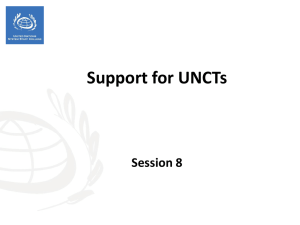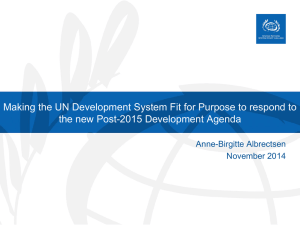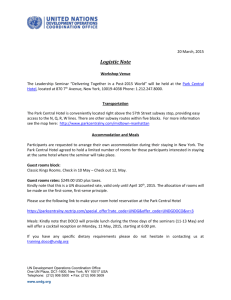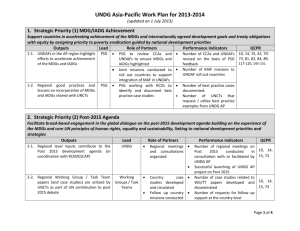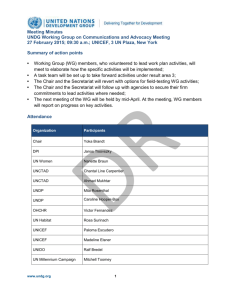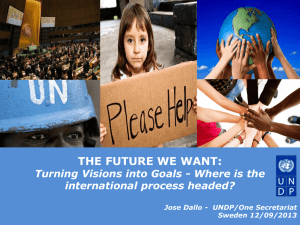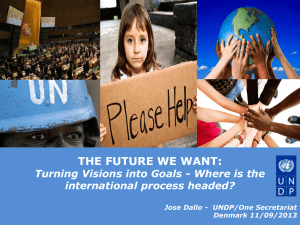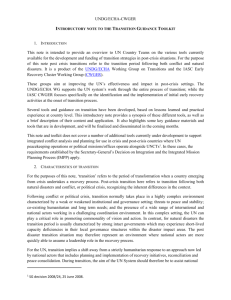Item 3c - UNDG Europe & CIS Work Plan for 2011
advertisement
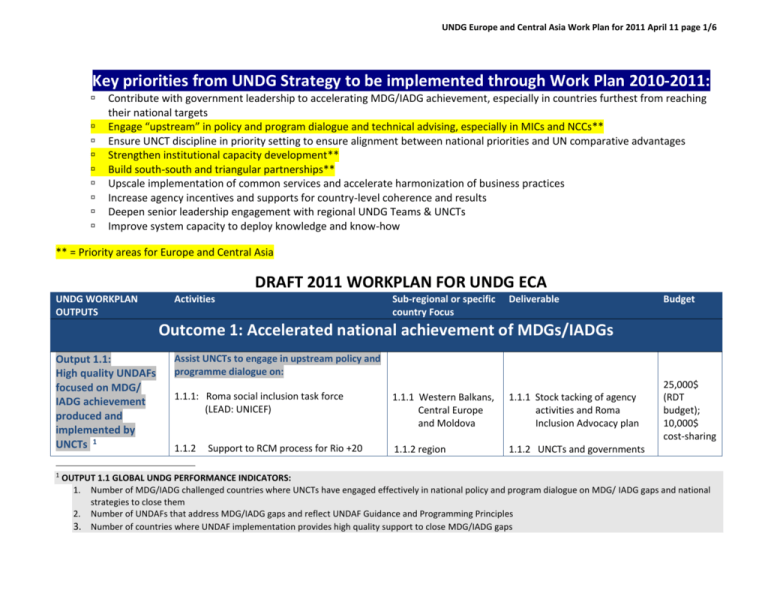
UNDG Europe and Central Asia Work Plan for 2011 April 11 page 1/6 Key priorities from UNDG Strategy to be implemented through Work Plan 2010-2011: Contribute with government leadership to accelerating MDG/IADG achievement, especially in countries furthest from reaching their national targets Engage “upstream” in policy and program dialogue and technical advising, especially in MICs and NCCs** Ensure UNCT discipline in priority setting to ensure alignment between national priorities and UN comparative advantages Strengthen institutional capacity development** Build south-south and triangular partnerships** Upscale implementation of common services and accelerate harmonization of business practices Increase agency incentives and supports for country-level coherence and results Deepen senior leadership engagement with regional UNDG Teams & UNCTs Improve system capacity to deploy knowledge and know-how ** = Priority areas for Europe and Central Asia DRAFT 2011 WORKPLAN FOR UNDG ECA UNDG WORKPLAN OUTPUTS Activities Sub-regional or specific country Focus Deliverable Budget Outcome 1: Accelerated national achievement of MDGs/IADGs Output 1.1: High quality UNDAFs focused on MDG/ IADG achievement produced and implemented by UNCTs 1 1 Assist UNCTs to engage in upstream policy and programme dialogue on: 1.1.1: Roma social inclusion task force (LEAD: UNICEF) 1.1.1 Western Balkans, Central Europe and Moldova 1.1.1 Stock tacking of agency activities and Roma Inclusion Advocacy plan 1.1.2 1.1.2 region 1.1.2 UNCTs and governments Support to RCM process for Rio +20 25,000$ (RDT budget); 10,000$ cost-sharing OUTPUT 1.1 GLOBAL UNDG PERFORMANCE INDICATORS: 1. Number of MDG/IADG challenged countries where UNCTs have engaged effectively in national policy and program dialogue on MDG/ IADG gaps and national strategies to close them 2. Number of UNDAFs that address MDG/IADG gaps and reflect UNDAF Guidance and Programming Principles 3. Number of countries where UNDAF implementation provides high quality support to close MDG/IADG gaps UNDG Europe and Central Asia Work Plan for 2011 April 11 page 2/6 UNDG WORKPLAN OUTPUTS Activities Sub-regional or specific country Focus Deliverable Budget engaged in sustainable development debate; Regional Sustainable development report (in collaboration with RCM) Assist UNCTs with high-level advice on prioritization, based on UNDAF Guidance and programming principles 1.1.4 Prioritization in UNDAFs (LEAD: UNICEF as the PSG Convening Agency) Moldova 1.1.4 RDT discussion with UNCT to facilitate prioritization; RDT Liaison to maintain contact through UNDAF planning process Fully implement technical support and quality advice functions to help UNCTs produce MDG/ IADG-focused UNDAFs 1.1.5 Quality Assurance review: Moldova UNDAF 35,000$ Moldova Promote sharing of country-level good practices between UNCTs in the region to accelerate achievement of the MDGs and promote South-South cooperation 1.1.6 Use regional meetings to call attention to good practices; both in coordinated agency based activities and through joint undertakings where relevant. 1.1.5 PSG review of Moldova UNDAF 1.16 Consult and review with UNCTs to identify regional good practices related to Rio +20 report and regional process Region UNDG Europe and Central Asia Work Plan for 2011 April 11 page 3/6 UNDG WORKPLAN OUTPUTS Activities Output 1.2: UNDG support for MDG/ IADG achievement at country-level fully coordinated with HLCP 2 Coordinate UNDAF technical assistance and quality advising to UNCTs with Regional Coordination Mechanisms (Lead: PSG convening agency) Sub-regional or specific country Focus Deliverable Focus on Moldova, other countries as relevant. 1.2.1 PSG review of UNDAF Budget 1.2.1. support follow-up to the MDG Regional Report, in close collaboration with RCM Outcome 2: Strengthened UN coherence and coordination at the country level Output 2.1: UNDG country-level operational efficiency increased through implementation of TCPR and SWC resolutions 3 Advocate for implementation of international agreements on aid effectiveness and on request support UNCTs in implementing them 2.1.1 Exchange of information on Busan High Level Forum on Aid Effectiveness On request, support UNCTs in implementing the recommendations from the UNDG-HLCM 2 Countries completing the OECD/DAC Aid Effectiveness survey this year: Albania, Armenia, Bosnia and Herzegovina, Ukraine, Tajikistan, Kyrgyzstan, Moldova + Kosovo4 TBD 2.1.1 RDT Strategy & Key Regional messages on development effectiveness/new MICs partnerships 2.1.2 Clarify realistic objectives for harmonization of business OUTPUT 1.2 GLOBAL UNDG PERFORMANCE INDICATORS: 1. Number of UNCTs integrating input through HLCP and UNDG expert networks and resources into UNDAF preparation 3 OUTPUT 2.1 GLOBAL UNDG PERFORMANCE INDICATORS: 1. Number of UNDG follow-up actions implemented from the TCPR, SWC and ECOSOC resolutions implementation plan, and the HLCM-UNDG high level mission 2. UNCT performance on aid effectiveness indicators 3. Measured reductions in transaction costs and/or increased efficiencies for UNCT business operations 4. Client feedback on UNCT management of pooled funds and MDTFs 5. Timeliness of allocation from the Expanded Delivering as One Funding Window to eligible countries 6. Timeliness and relevance of Regional UNDG Team, Global UNDG and DOCO support to DaO pilot countries 4 As referred to in Security Council resolution 1244 UNDG Europe and Central Asia Work Plan for 2011 April 11 page 4/6 UNDG WORKPLAN OUTPUTS Activities Sub-regional or specific country Focus high level mission on harmonization of business practices 2.1.2 Establish Regional Inter-agency Operations group On request, support UNCTs which have voluntarily focused on greater coherence, effectiveness and relevance at country level Deliverable practices for the region. Montenegro, Albania, Kyrgyzstan 2.1.3 Respond to country requests 2.1.3 Review progress and identify challenges in Delivering as One. Provide policy advice as needed. Other related activities 2.1.5 Output 2.2: The Management & Accountability System fully implemented at all levels and reviewed Follow up on MICs/ Triangular cooperation work (Lead: UNFPA) Provide strategic leadership in fully implementing the M&A system and its implementation plan 2.2.1 2.1.5. Position Paper by UNDGECA on Partnerships in MICs & Triangular Cooperation Ensure RDT/UNCTS know and understand the implications of the M& A system implementation plan. Region Regional input to the global Management and Accountability Review Budget UNDG Europe and Central Asia Work Plan for 2011 April 11 page 5/6 UNDG WORKPLAN OUTPUTS Activities globally, with senior leadership engagement 5 Fully implement all core functions in the M&A system and its implementation plan 2.2.2 Sub-regional or specific country Focus Region Deliverable All eligible RCs 2.2.3 Annual performance appraisal 2.3.1 2.3.1 Central Asia Risk Reduction Coordination meeting April 14-15; including technical papers Review regional progress of all agencies progress towards agreements in the M/A plan. 2.2.3 Use One 80 Competency development tool to gain understanding of UNCT dynamics Support competency development and appraise performance of Resident Coordinators and UN Country Teams 2.2.3 Hold annual performance assessment of Resident Coordinators as per UNDG procedure On request, support UNCTs in crisis and transition planning Output 2.3: UNCT post-crisis and transition plans, 2.3.1 Central Asia Risk Assessment programmes and (Lead: UNDP; sector leads: UNECE, operations reflect UNICEF, FAO, OCHA) Secretariat and UNDG decisions, 2.3.2 Clarify role of Regional UNDG team in recommendations, crisis response and guidelines 6 Central Asia 5 OUTPUT 2.2 GLOBAL UNDG PERFORMANCE INDICATORS: 1. Number of action points in the M&A system and its implementation plan fully implemented 2. Number of UNDG organizations with established incentives for implementation of the M&A system at all levels 3. Number of individual and joint missions by agency leaders and ASGs across UNDG to support M&A system implementation 6 OUTPUT 2.3 GLOBAL UNDG PERFORMANCE INDICATORS: Budget UNDG Europe and Central Asia Work Plan for 2011 April 11 page 6/6 UNDG WORKPLAN OUTPUTS Activities 2.3.3 Sub-regional or specific country Focus Deliverable Budget Support UNCTs in Emergency preparedness including contingency planning where needed Outcome 3: UN Development System More Effectively Deploys Knowledge and Know-how Output 3.1 Regional/ Global Expert Networks are strengthened and utilized in support of UNDG priorities 7 On request, and in coordination with RCMs, facilitate UNCT access to regional/global expertise and resources (including SouthSouth and triangular), to support quality and coherence in programming, operations and M&A system implementation Region 3.1.2: To be discussed: UNECE statistical support as a basis for discussion Output 3.2 Knowledge management systems are functioning to support achievement of UNDG priorities 8 Contribute to UNDG knowledge management efforts, including independent evaluations of M&A System and Delivering as One (DaO) Pilots RDT discussion of DaO independent evaluations 1. 2. 3. 7 3.2.1 Draw lessons learnt on Operations in Joint Programming [Lead: UNDP] Albania (Delivering as One); all region for M&A system Western Balkans (MDGF projects); Kazakhstan etc. (Human Security Funded projects) Number of UNCTs fully implementing country-level recommendations from SG’s Report on Peacebuilding Number of UNCTs fully implementing post-crisis and transition planning and guidance Number of UNDG organizations with explicit support and accountability mechanisms for agency contributions to crisis and transition planning and coordination OUTPUT 3.1 GLOBAL UNDG PERFORMANCE INDICATORS: 1. Frequency of UNCT and Regional UNDG Team use of regional/global expert networks and resources in support of UNDG priorities 2. Feedback from UNCTs, Regional UNDG Teams and regional/global expert networks on usefulness of their interactions 8 OUTPUT 3.2 PERFORMANCE INDICATORS: 1. Feedback from UNCTs on usefulness of UNDG guidance, tools and other written resources 2. UNDG feedback on quality and consistency of DOCO monitoring and analysis 3. Partner feedback on UNDG support for South-South and triangular partnerships
